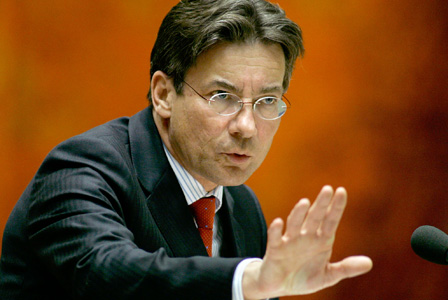Minister Verhagen stelde dat de uitnodiging van Lukashenko voor de top in Praag de mensenrechtensituatie in Wit-Rusland zou trivialiseren.
Bron: The International Herald Tribune
“Lukashenka should not be given a political platform,” he said at an EU foreign ministers meeting. The ministers debated plans for the EU leaders to sign an “Eastern Partnership” with their counterparts from Ukraine, Moldova, Georgia, Armenia, Azerbaijan and Belarus in Prague on May 7. Concerned about Lukashenka’s authoritarian rule, the EU imposed a travel ban on him and 34 other Belarusian officials in 1999, along with freezing their assets. The travel ban was lifted recently to allow Lukashenka – whom some in the West call “Europe’s last dictator” – to amend his ways and come to Prague.
The EU foreign ministers made no decision, said EU External Relations Commissioner Benita Ferrero-Waldner who had proposed “to give Lukashenka another chance.” She said there was still time “to see how things will evolve,” refering to April meetings with Belarus officials and non-governmental groups about human rights and other issues.
The European Commission hopes to forge closer ties with six ex-Soviet republics – where Moscow retains much sway. The proposed partnership would offer the EU’s eastern neighbors free trade, economic assistance, regular security consultations, economic integration, technical expertise and visa-free travel. The partnership will be open to those neighbors that commit to democracy, the rule of law, sound economics and human rights.
In the past year, EU officials said, Belarus has made modest improvements in its rights record, notably by allowing two newspapers that had been banned to start publishing again. A dozen others remain banned. The EU’s desire to accommodate Belarus reflects the growing importance the bloc gives to stability on its eastern doorstep. The region is crucial to the flow of energy to the EU.

